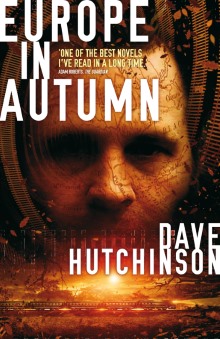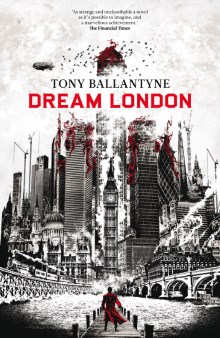Europe at Midnight (42 page)
“Not all the former members of the Committee were arrested,” I told him “Some of the people who are attending dinner parties in Brussels and Strasbourg and London right now were party to two acts of genocide. One against my people and one against yours, however
accidental
it was.”
“It’s out of our hands,” he said. “You and I, people like us, we’re blank spaces. We don’t really exist until someone colours us in. Here be monsters.” He folded his hands in his lap again and his head nodded forward until his chin almost touched his chest. I thought he had fallen asleep, but he said, “What will you do now?”
“I thought I’d travel. Perhaps see the United States. Australia.”
He raised his head, with some effort. “The Service won’t let you, you know.”
“The Service has to find me first.”
“You’ll not find it easy to get out of the country.”
“Maybe I’ll get the Coureurs to help.”
He chuckled, a genuine happy chuckle. “Bless them.” He sat up straight in his chair. “Would you help me back to the car? There’s a good chap.” He hadn’t touched his tea, or his biscuits.
T
HE SUN HAD
gone in again and it was getting chilly. A breeze blew across the car park. He huddled up within his overcoat, handed one of his crutches to me, and took my arm, and I helped support his weight as we walked to his car.
“Adele once told me that the problem with people like us is that we only ever see parts of the story,” he said. “Or we see it from odd angles and perspectives. We very rarely see the whole picture. There’s a story – I don’t know whether it’s true or not – that during the Second World War Polish women used to collect old used cleaning rags from the German armoured regiments that had occupied their country. The rags were then sent off for analysis by the Polish resistance and the viscosity of the oil on them was tested. You see, you need different viscosities of oil for different weather conditions. The theory was that a sudden change would signal preparations for a German invasion of Russia. Could we just pause for a moment, please?”
We stopped and he leaned his weight on me while he got his breath.
“We’re like those old Polish women,” he went on. “Collecting rags, never knowing what the results of the analysis are.”
“You don’t have to apologise,” I told him. “You really don’t. You didn’t force me to go.”
“It all seems...” He looked around the car park and sighed heavily. “So
pointless
. Who’s your friend?”
He was looking at my car. I didn’t bother to ask how he knew it was mine. A figure was standing beside it, leaning on the roof, smoking. I said, “You have a minder, so do I.” I’d seen the large well-dressed gentleman sitting in the driver’s seat of the shiny black SUV as I’d walked towards the visitor centre. For people who were supposed to be trained in covert matters, they were surprisingly visible.
He looked at me,
I said, “It’s not you I don’t trust.”
He smiled sadly. “No. I suppose not.” He thought for a moment. “You know, you never told us what your real name is.”
That was true, and there seemed no harm in it now, so I told him.
“Thank you,” he said, genuinely pleased. “Thank you. Shall we carry on?”
We walked the rest of the way to the SUV. The driver was already out of the car and holding one of the rear doors open. He helped his passenger inside, then went back behind the wheel, started the engine, and drove off.
I stood watching them go for a minute or so, then I sighed and walked back to my car.
“They don’t know where Mundt is,” I said.
“They don’t or he doesn’t?” asked Rudi.
“He wouldn’t have asked me if they hadn’t told him to. They don’t know.”
Rudi finished his small cigar and ground the end out under his toe. “Personally, I hope Herr Professor Mundt just keeps on running.”
“It’s not safe. He knows how to open and close the border crossings. That’s why they wanted to kill him and take his research.”
He sighed. “I know.” He took his cane from where it was leaning against the side of the car and limped around to me. “There’s every chance in the world that they want you to find him for them,” he told me. “I know how they think. You find him, they find you, game over.”
“I told you to stay in the car,” I said. “That driver will have taken a photograph of you.”
“It doesn’t matter. Let them know we’re together. We’ll be in Scotland by tomorrow morning. After that, it’s a big Continent.” To his credit, he hadn’t tried to argue me out of this meeting. I had presented it to him this morning and he had simply factored it into his plans. He struck me as very self-contained, used to his life making sudden right-angled turns, as if he genuinely couldn’t be surprised any longer, but there was a hunger about him, a need for intelligence, and I had no idea what that was about. It wasn’t like a nation’s need for intelligence; it was more deeply personal. “Did he say anything about Molson?” Rudi was very interested in Andrew Molson.
I shook my head. “Someone told Bevan to expect me,” I said. “That’s why they moved so quickly when I claimed asylum; they were waiting. Somebody told them I was coming.”
“Molson.”
“I don’t see how.
I
didn’t know I was coming.” I shrugged.
Waves ‘don’t know’ flag
.
He said, “I’m working on a project. I was wondering whether you’d like to join in.”
“What kind of project?”
“I’m not sure what you’d call it. Research. Tying up loose ends. Trying to find the secret of the universe.”
That made me smile. “I wish you luck with that.” In my experience, the universe didn’t have any secret. It had a poor sense of humour, but that was no secret, if you thought about it.
Rudi started to walk back to his side of the car. “Let me cook dinner for you, and we’ll talk about it.”

I
’M INDEBTED TO
Caroline, for the presence of Mr Songer’s Wee in this story, and to Gem, for her musings about the nature of the Eurovision Song Contest in autumnal Europe. I’m also indebted to Liza and Cary, who beta-read the book. All mistakes are mine, not theirs.
∗hugs∗

NOMINATED FOR THE 2015 ARTHUR C. CLARKE AND JOHN W. CAMPBELL AWARDS
Rudi is a cook in a Kraków restaurant, but when his boss asks Rudi to help a cousin escape from the country he’s trapped in, a new career – part spy, part people-smuggler – begins. Following multiple economic crises and a devastating flu pandemic, Europe has fractured into countless tiny nations, duchies, polities and republics. Recruited by the shadowy organisation
Les Coureurs des Bois
, Rudi is schooled in espionage, but when a training mission to The Line, a sovereign nation consisting of a trans-Europe railway line, goes wrong, he is arrested and beaten, and Coureur Central must attempt a rescue.
With so many nations to work in, and identities to assume, Rudi is kept busy travelling across Europe. But when he is sent to smuggle someone out of Berlin and finds a severed head inside a locker instead, a conspiracy begins to wind itself around him. With kidnapping, double-crosses and a map that constantly re-draws itself,
Europe in Autumn
is a science fiction thriller like no other.
‘One of the best novels I’ve read in a long time.’
Adam Roberts,
The Guardian
‘
Europe in Autumn
is the work of a consummate storyteller and combines great characters, a cracking central idea, and a plot that will keep you on the edge of your seat. Excellent.’
Eric Brown

Available from DriveThru Fiction


Captain Jim Wedderburn has looks, style and courage. He’s adored by women, respected by men and feared by his enemies. He’s the man to fi nd out who has twisted London into this strange new world.
But in Dream London the city changes a little every night and the people change a little every day. The towers are growing taller, the parks have hidden themselves away and the streets form themselves into strange new patterns.
There are people sailing in from new lands down the river, new criminals emerging in the East End and a path spiraling down to another world.
Everyone is changing, no one is who they seem to be.
‘A real feat of the imagination, this is a really exceptional book, unlike anything I’ve ever read before.’
Chris Beckett
‘As strange and unclassifiable a novel as it’s possible to imagine, and a marvellous achievement.’
The Financial Times
